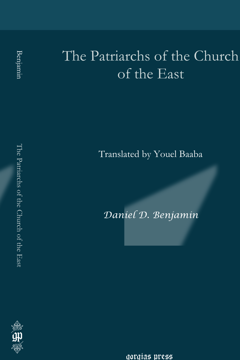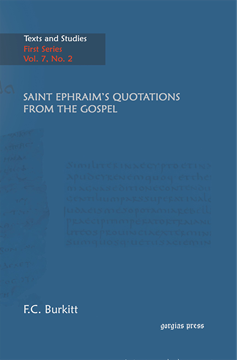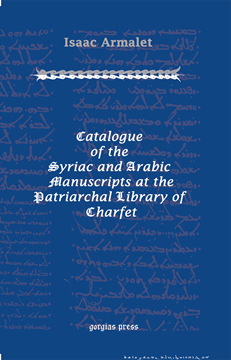The Patriarchs of the Church of the East
Translated by Youel Baaba
ISBN: 978-1-59333-741-4
A comparative chronology of the Patriarchs of the Church of the East based on twenty-two sources, five of which are previously unpublished. Benjamin reveals a great number of differences between the sources. Benjamin also highlights inconsistencies, omissions, errors and dates of succession of some patriarchs that appear to have been based on assumption.
$79.00 (USD)
Saint Ephraim's Quotations From The Gospel
Series: Texts and Studies (First Series) Vol. 7, No. 2
ISBN: 1-59333-320-X
This book attempts to determine the Gospel text used by Ephraim, and the bearing his quotations have upon the date of the Peshitta. Ephraim is one of the figures from the Syriac-speaking Church whose name is well known in both East and West. His surviving works are by themselves as voluminous as all other remains of Syriac literature earlier than 400 AD. Ephraim’s death in roughly 373 AD means that his Gospel text predates the 5th century and attests a text older than many of the extant manuscripts.
$111.00 (USD)
Introduction to Semitic Comparative Linguistics
By Louis Gray
ISBN: 978-1-59333-196-2
Although it is a discipline with a venerable heritage, comparative Semitic linguistics has long suffered from the difficulty of finding an introduction that does not already require a specialists’ knowledge of the field. The primary languages Gray selected were Hebrew, the language most Semitic readers begin with, and Arabic, the most widely known Semitic language. The result is this user-friendly introduction.
$124.00 (USD)
A History of the Russian Church in Australia
ISBN: 1-59333-321-8
This work chronicles the development of the Russian community as it struggles to become a viable partner in Australia’s multicultural society. Russian presence in Australia dates back to 1807 when the first Russian Antarctic explorers arrived in Australian waters. The community grew quickly in the 20th century after the Russian Revolution and it was then that the Russian Orthodox Church was established in Australia. The author also comments on the situation of the present day community.
$214.00 (USD)
The Glorious Encounters of a Divine Adulterer
ISBN: 0-9627950-5-4
The loves of the Olympian Zeus included countless immortal and mortal women, and one boy. The offspring, such as Apollo, Bacchus, Herakles, Helen of Troy and many others remain legendary. Section II is a 70-page modern debate on sexuality and spirituality.
$33.00 (USD)
Catalogue of the Syriac and Arabic Manuscripts at the Patriarchal Library of Charfet
ISBN: 1-59333-365-X
Isaac Armalet’s catalogue gives the first detailed description of the Syriac, Garshuni and Arabic manuscripts at the Syriac Catholic Patriarchal Library at the Monastery of Charfet in Lebanon. The manuscript collection was established there in the eighteenth century and contains biblical, liturgical, and theological texts of importance to understanding the Christian heritage of the East.
$229.00 (USD)





